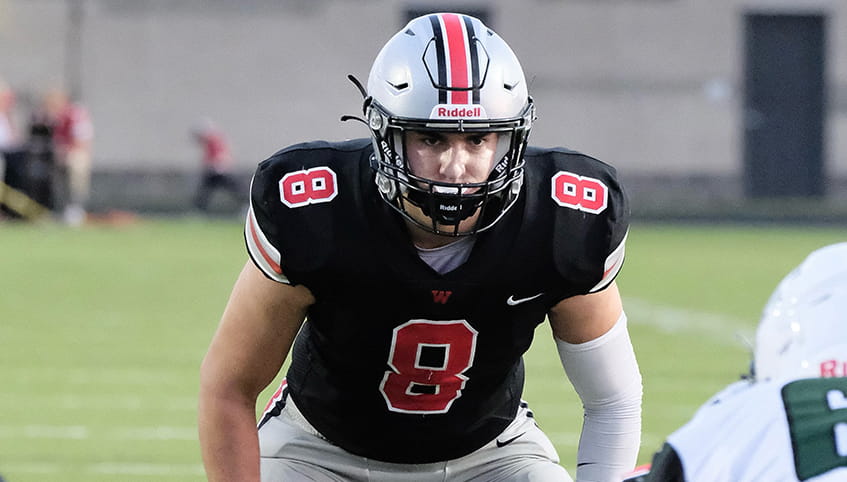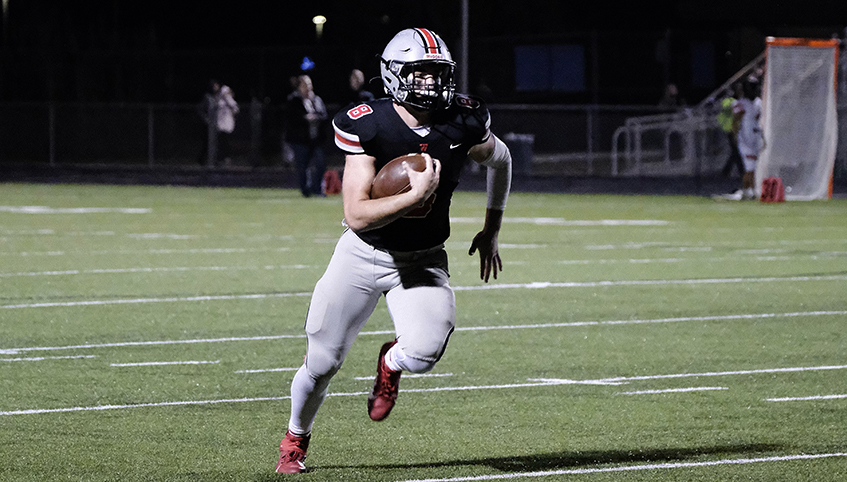- Home
- News Room
- Patient Stories
- Surgery Provides Lasting Relief After Core Muscle Injury
July 13, 2023
Zach Darche tried to ignore the pain in his lower abs.
He was no stranger to pain, after all. As a high school junior, he’d torn the labrum in his right shoulder and had surgery at The University of Kansas Health System to repair it. He was finishing out a summer baseball season and training for his senior season of football. He had high hopes of being recruited to play college football, and he really didn’t want anything holding him back.
But unfortunately, the ab pain didn’t go away.
“I used lidocaine patches. I did a whole bunch of stuff just to try to ease the pain,” he says. “But playing football on Friday nights – it was never pain-free.”
To his advantage, Zach had an expert in his own house. His dad, JP Darche, MD, is a sports medicine physician at the health system and a former professional football player, including for the Kansas City Chiefs.
“I think anybody who’s a parent that has kids who play sports, it’s always hard when your kid is hurting and has an injury,” Dr. Darche says. “You’re always hoping that everything’s going to be fine, but it did not go away.”
Seeking a solution
The Darches met with Scott Mullen, MD, an orthopedic surgeon at the health system. Dr. Mullen diagnosed Zach with a core muscle injury. This is sometimes mistakenly called a sports hernia. A CMI is common among football players like Zach and occurs because the abdominal muscle and thigh muscle pull in opposite directions but are attached at the same spot on the pubic bone. Repetitive motion and force can tear that attachment, causing a core muscle injury.
Dr. Mullen advised Zach to start with conservative treatment. In addition to pain relievers and a steroid injection, Zach headed to the Sports Medicine and Performance Center in Overland Park, Kansas, to work with physical therapist Kyle Veazey, PT, DPT. Veazey explained that in this case Zach didn’t have much risk of doing any further damage during the football season. That meant the goal of physical therapy was to make sure he could feel as close to 100% as possible for each game, knowing there would be pain and soreness afterward.
“Zach had the right approach mentally. He had a really good understanding after his conversations with Dr. Mullen about not causing any more severe of an injury,” Veazey says. “One to 3 days after the game, he was very sore, but he never got discouraged by that.”
However, it became obvious to Zach that the injury and the pain would keep nagging him if he didn’t find a more permanent solution. And feeling better became even more important to him after he committed to play college football at the University of Pennsylvania.
He was a good candidate for surgery because he’s a motivated patient. Motivated patients with these types of problems do better in the long run because they’re compliant with physical therapy and their home exercise program. He’s got his eye on the prize of playing collegiate football. Scott Mullen, MD
Orthopedic surgeon
Healing the core muscle injury with surgery
As soon as the high school football season ended, Dr. Mullen performed a bilateral core muscle repair with bilateral adductor longus tenotomy on Zach. This surgery repairs the tear and releases the tension between the 2 muscles.
Zach said it was an easy decision for him to make.
“We just decided to get rid of it with the surgery and not have to worry about it coming back or anything,” he says. “Dr. Mullen was able to get me in and get me going, so it was the easy decision.”
Dr. Mullen agreed that it was a good decision given Zach’s desire to continue playing high-level football.
"Zach was 18 years old and barely able to make it through his high school season. He muscled through it. He had college scholarships on the line to play football, and he couldn't play through pain for the next 4 years," Dr. Mullen says. “He was a good candidate for surgery because he’s a motivated patient. Motivated patients with these types of problems do better in the long run because they’re compliant with physical therapy and their home exercise program. He’s got his eye on the prize of playing collegiate football.”

Getting back to full strength
Zach did put in the work to make a full recovery. Immediately following this surgery, patients are encouraged to start walking a mile each day. Veazey said that before the 2-week mark, Zach was able to start jogging again. After 6 weeks, he was able to start working with Roger Allen, CSCS, in sports strength and conditioning.
Watch Zach and Allen during a strength and conditioning session at the Sports Medicine and Performance Center and learn more about the exercises he incorporated to prepare for playing football again.
Roger Allen:
All right, so once you get through the ladder, finish with the brace. Ready, go! Switch, switch, switch. Burst! There you go.
Zach Darche:
I'm Zack Darche and I had a core muscle injury. At first it was every movement, I did every subtle thing hurt. And I was like, I didn't really know how long this was gonna last, playing football on Friday nights, I would do like lidocaine patches and I would take painkillers so I mean, I did everything I could to ease it, but I knew the whole time it would, it wouldn't go away. But it’s been super helpful here with Roger. I mean it was weeks after my surgery I was already working with him.
Roger Allen:
My name is Roger Allen, and I'm the strength and I’m the strength and athletic development supervisor for The University of Kansas Health System. Ready, Go! Get out of the break. Push! There we go, that’s it. Zach has to be extremely agile being able to go in every single plane and direction. He has to go backwards, forwards, lateral, sideways. That's the reason why we're doing all these multi plane, multi-directional drills. Time to lift! Time to get swoll! Let’s get it. Easy money. Right now what we're doing our chain bench presses are gonna get easier and lighter as you go down, but on the way up, it gets heavier 123. So this is what this simulates, coming up down a line of scrimmage, push a big offense lineman off of him, shed, go make a tackle. Nice.
Zach Darche:
Working out with Roger has been an incredible experience more a friend than a trainer. He makes me enjoy coming in here. You know, he's kind of just leading me through the little things going back to square one. And he's built me up all the way to now where I'm doing everything at high intensity.
Roger Allen:
You don’t really realize how important your trunk is until you hurt it.
Zach Darche:
I realized that there wasn't any things that didn't hurt.
Roger Allen:
All good?
Zach Darche:
Let’s do it.
“Zach is the type of athlete and the type of young man who really is committed and focused,” Veazey says. “He has a resilience about him, both physically and mentally, that is uncommon for someone his age. His outlook, his approach, his consistency are all attributes that set him apart and will continue to help him in his athletic pursuits.”

Specialized performance training
No matter your age, background or sport, you can become a better athlete and improve your fitness at our sports performance center.
Advice for other athletes
Zach says he’s glad he had the surgery and would recommend it to other athletes struggling with a core muscle injury.
“I know having the symptoms of the injury, I wouldn’t want to worry about it lingering with me or coming back. And it’s not a crazy process,” he says. “I know surgeries can be scary, especially in the abdomen area, but I would definitely recommend doing the surgery and getting it out of the way.”
Dr. Mullen and Veazey both mentioned that core muscle injuries are frequently overlooked, dismissed or misdiagnosed. It might be labeled a hip flexor strain, sore abs or a hernia. That’s why it’s important to communicate and seek out quality care.
“I would encourage athletes, or their parents, that if you’re having soreness symptoms that seem extreme or intense – don’t hide that. Don’t ignore that. Go talk to your athletic trainer. Go talk to your coach about it. You need to let someone know, so that if it is this type of a core muscle injury, then you're not putting yourself through unnecessary pain or possibly causing further problems,” Veazey says.
The sports medicine team at the health system – its doctors, surgeons, physical therapists, nurses and more – are specialists who will collaborate to get you the best care. Thanks to that, Zach is now excited to head to UPenn to play football and major in biology. He has his sights set on both med school and professional football.
“That’s the dream,” Zach says.






